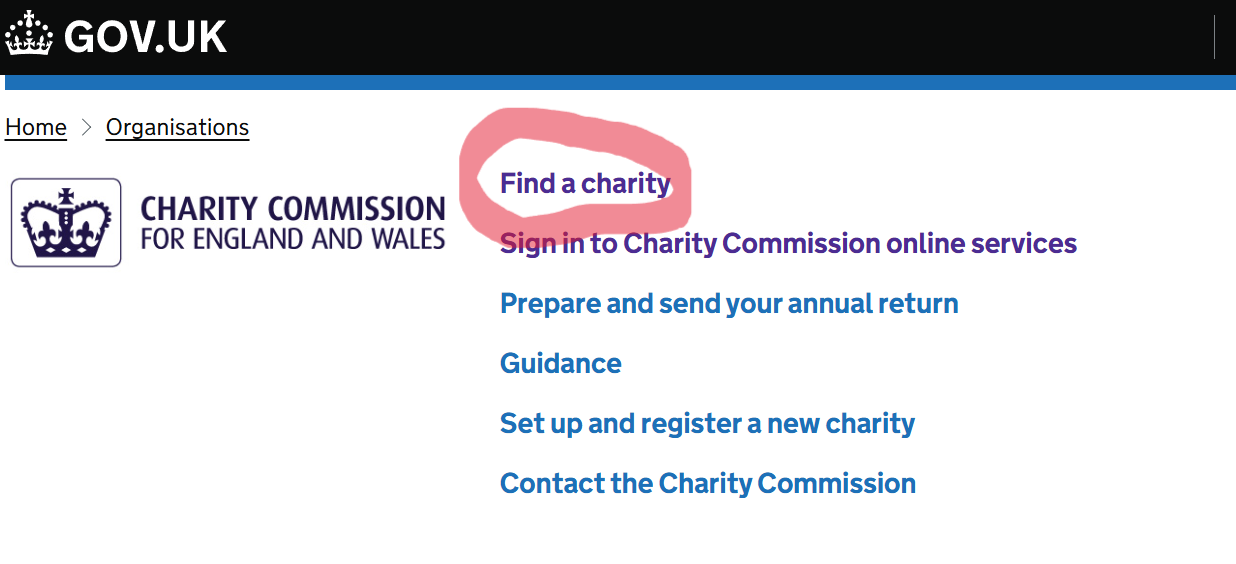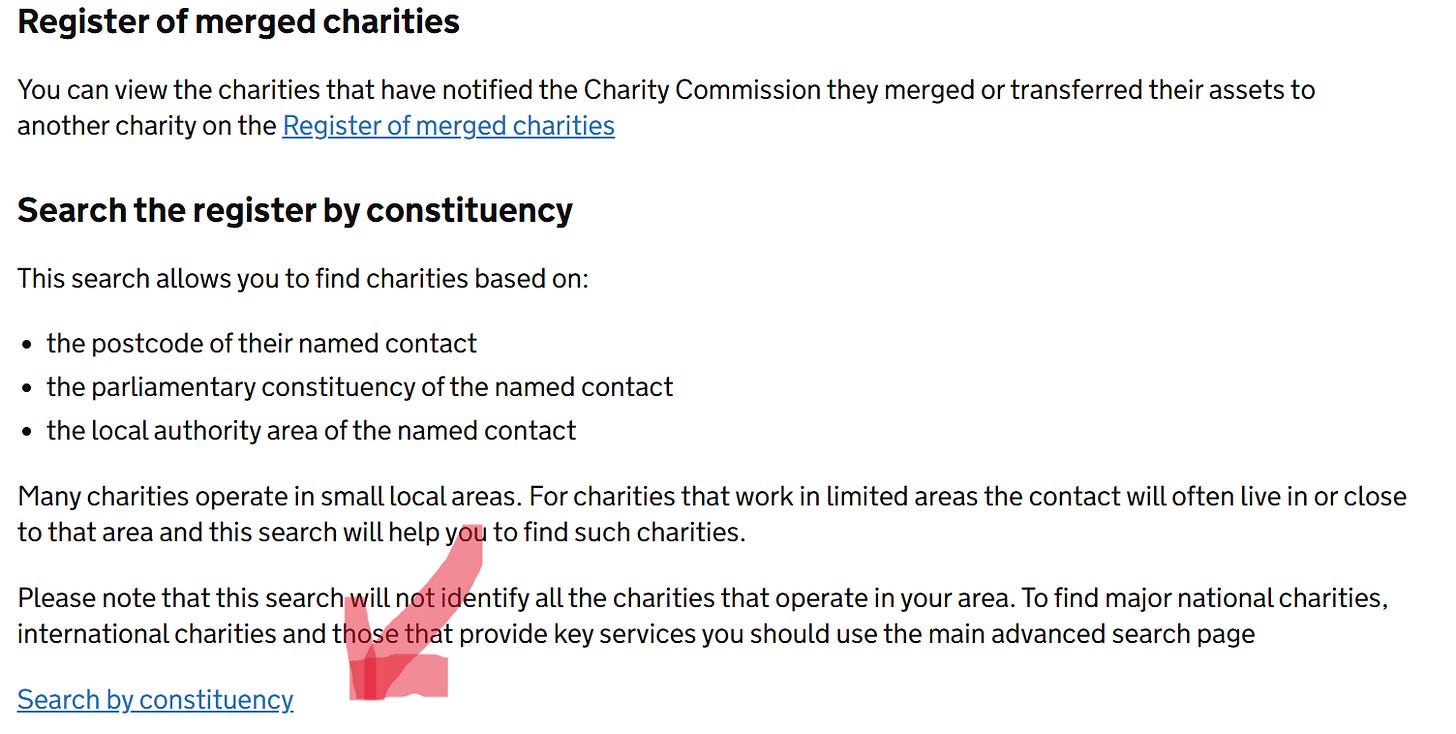Today’s article…
is all about research!
Today we have links to loads of brilliant resources for you, plus a nod to JLo (because, why not?).
Thank you all for being here and have a fantastic week,
Tony and Caroline
p.s. Want access to weekly posts on topics including research, strategic planning, building relationships and setting (sensible) targets?
You can upgrade your subscription today for £7 a month or £70 a year.
Ten places to look for funding for your charity or nonprofit
by Caroline Danks

Regular research is great practice even for those charities with an established fundraising programme. New trusts are always being created and others are always closing. Trusts regularly update their criteria and are known to change their areas of focus.
Fresh research will keep your prospect pool relevant and up to date.
There are several resources to help you do this. Here are ten I recommend
Please note, there are no affiliate links in the post and none of the providers listed have paid me to say nice things about them.
1. Funds Online
DSC Funds Online is a new database, replacing the v popular Trustfunding.org.
Annual subscriptions start from £450 plus VAT for a one user licence for a registered charity. You can also get a one week licence (which I think start at around £150 if you want to do all your research in one go).
It’s a real joy to use and quickly enables you to do a first sift of suitable prospects, gathering a mass of names and headline information very quickly.
If you’re starting from scratch and want a sense of the size of the opportunity for your cause, it’s probably worth the investment.
2. Grants Online
If your budget won’t stretch to Funds Online then Grants Online might be better for you?
Costs range from £17 + VAT for a 1 month / single user to £750 + VAT for a year long licence for up t0 20 users.
They also have a free monthly newsletter.
3. GRIN (Grants Resources and Information News).
A self described ‘fun size’ company run by Paul and Dominie (both lovely, collaborative people). They have a database and a weekly news bulletin.
I love the weekly news bulletin, news of new funders, updates on existing funders (including changes of criteria, launch of a one-off funding round).
They also include information about lottery funding and government grants, all for £15 a year for an individual user which is a total bargain (many of our online course students told us that the discovery of the GRIN daily bulletin was worth the cost of the course alone)!
4. Community Foundations
Community Foundations are a good source of local funding information. They administer trusts and foundations on behalf of individuals and companies and often government grants too.
My local community foundation is pretty friendly (shout out to Laura at Devon Community Foundation!) and are always willing to have a phone conversation if you’d like to talk through your options for researching prospective trusts and foundations.
Visit UK Community Foundations to find your local one.
5. Charity Commission constituency search
Looking for more local support?
Do a constituency search on the Charity Commission site to find all the trusts and foundations active in your local parliamentary constituency.
Step 1, go to the Charity Commission homepage and select ‘find a charity’
Step 2, scroll down until to you get to the section entitled ‘Search Register by Constituency’
Step 3, select your parliamentary constituency
Please note that you’ll be given a list of ALL charities local to you, both grant making and direct delivery. You’ll need to use your instincts to figure out which might be relevant.
I like to hone in on names (grant makers tend not to have schools, scouts or diseases as part of their names) and turnover (if there are lot to get through you may want to set a minimum turnover for consideration)
By way of example:
From this list, you’d probably want to make a note of the John and Diana Kemp-Welch Charitable Trust, but not so much the Second Church of Christ Scientist London Promotion and Benevolent Trust (there will be loads of churches to wade through…).
Already done this? Search your neighbouring constituencies too to identify more local trusts and foundations.
6. Supporters of other charities
Some charities list their supporters in a ‘thank you’ page in their annual reviews, listing the names of the people who fund them.
Those whose work aligns somewhat with yours can be great source of information about potential funders.
Take a look at the annual reviews of other charities working in your field or in your local area and see if you can identify some names to research for your own cause.
It feels a bit naughty, but everyone does it…
Fellow trust fundraiser Alicia Grainger sets out the process in more detail in this fab blog post.
7. Google
Also, other search engines are available.
For potentially high profile trustees, pop their names into Google and search for ‘news’.
Reading profiles or interviews can give you a strong sense of what they’re like as a person, their approach to business, their family values and, if you’re lucky, their philanthropic ambitions.
Sometimes, you’ll come across reporting of sketchy behaviour (hello Sacklers!) which may require you to consult your gift acceptance policy before you head down the road of making an approach.
8. UK Grantmaking
Highlighted in this post on LinkedIn by the excellent Lucy Stone, this report is the ‘definitive annual publication on grant funding in the UK’.
Ooh!!!
You had me at ‘definitive’.
Crucially for the purposes of this article, it lists a range of grant makers according to different categories including Family Foundations, Corporate Foundations, Donor Advised Funds and Fundraising Foundations.
Absolutely worth your time – thanks Lucy for the tip off.
Lucy is Director of No Stone Unturned Fundraising – check out the insights page on her website for more ideas on where to look for funding.
9. The List
Arguably also definitive, The List of recent changes to grant making practices has been collated, shared and is regularly updated by Jo Jeffery and several helpful, team spirited fundraisers.
With more changes in 2024 than dresses at one of JLo’s weddings, the UK grant making sector requires careful navigating at present.
Jo’s list plays an important role in keeping us abreast of closures, pauses and timescales.
Do yourself a favour and get your pipeline out. Scan through it with The List in front of you and update it with any changes.
Find The List here. Updates are published on Jo’s Substack Circles.
10. And finally
After some more places to look?
My colleague Alicia Grainger has an amazing free download from her website called 101 ways to grow your prospect list which contains a much more detailed list of both free and paid research resources.
Thanks Alicia! We appreciate you!
**Bonus idea**
Reader Abigail suggested adding Real World Fundraising’s 'monthly round up of newly registered trusts.
Their website says:
“Our curated monthly round up helps charities identify newly registered trusts, without having to do extensive research. Subsidised 12 month subscriptions are offered for £150.”
Abigail reports finding the round up ‘really useful’ and adds ‘we’ve had quite a bit of success with it.’
Thanks for reading this article!
Our archive has over 60 posts about all things fundraising. Want to know more about developing relationships with donors, research, writing, stewardship?
Upgrade your subscription today and you can have it all.
All of it.
Plus its only £7 a month or £70 for the year. Much cheaper than most other training options…








Thank you for shouting out The List. LOL 'With more changes in 2024 than dresses at one of JLo’s weddings'
Love this list. Thanks for sharing. One tip on the Charity Commission search. Their is a box you can tick on the advanced search that will only show grantmaking charities.